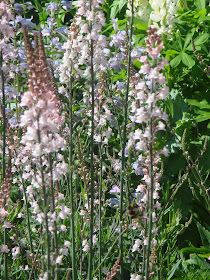
Perhaps it's a little late, but Christmas doesn't end on the 25th, you know. In the true medieval spirit of festival and octave, this is a Christmas post. And here's one of my favourite Christmas sermons:
John Donne's sermon at St Paul's for the evening of Christmas Day, 1624.
The air is not so full of motes, of atoms, as the Church is of mercies; and as we can suck in no part of air, but we take in those motes, those atoms; so here in the congregation we cannot suck in a word from the preacher, we cannot speak, we cannot sigh a prayer to God, but that whole breath and air is made of mercy. But we call not upon you from this text, to consider God's ordinary mercy, that which he exhibits to all in the ministry of his Church, nor his miraculous mercy, his extraordinary deliverances of states and churches; but we call upon particular consciences, by occasion of this text, to call to mind God's occasional mercies to them; such mercies as a regenerate man will call mercies, though a natural man would call them accidents, or occurrences, or contingencies.
A man wakes at midnight full of unclean thoughts, and he hears a passing Bell; this is an occasional mercy, if he call that his own knell, and consider how unfit he was to be called out of the world then, how unready to receive that voice, "Fool, this night they shall fetch away thy soul." The adulterer, whose eye waits for the twilight, goes forth, and casts his eyes upon forbidden houses, and would enter, and sees a Lord have mercy upon us upon the door; this is an occasional mercy, if this bring him to know that they who lie sick of the plague within, pass through a furnace, but by God's grace, to heaven; and he without, carries his own furnace to hell, his lustful loins to everlasting perdition. What an occasional mercy had Balaam, when his ass catechised him: What an occasional mercy had one thief, when the other catechised him so, "Art not thou afraid, being under the same condemnation?" What an occasional mercy had all they that saw that, when the Devil himself fought for the name of Jesus, and wounded the sons of Sceva for exorcising in the name of Jesus, with that indignation, with that increpation, "Jesus we know, and Paul we know, but who are ye?"
If I should declare what God hath done (done occasionally) for my soul, where he instructed me for fear of falling, where he raised me when I was fallen, perchance you would rather fix your thoughts upon my illnesses and wonder at that, than at God's goodness, and glorify him in that; rather wonder at my sins, than at his mercies, rather consider how ill a man I was, than how good a God he is. If I should inquire upon what occasion God elected me, and writ my name in the book of life, I should sooner be afraid that it were not so, than find a reason why it should be so. God made sun and moon to distinguish seasons, and day, and night, and we cannot have the fruits of the earth but in their seasons. But God hath made no decree to distinguish the seasons of his mercies. In paradise, the fruits were ripe the first minute, and in heaven it is always Autumn, his mercies are ever in their maturity. We ask panem quotidianum, our daily bread, and God never says you should have come yesterday, he never says you must again tomorrow, but today if you will hear his voice, today he will hear you.
If some king of the earth have so large an extent of dominion, in North, and South, as that he hath Winter and Summer together in his dominions, so large an extent East and West, as that he hath day and night together in his dominions, much more hath God mercy and judgment together: He brought light out of darkness, not out of a lesser light; he can bring thy Summer out of Winter, though thou have no Spring; though in the ways of fortune, or understanding, or conscience, thou have been benighted till now, wintred and frozen, clouded and eclipsed, damped and benumbed, smothered and stupefied till now - now God comes to thee, not as in the dawning of the day, not as in the bud of the spring, but as the Sun at noon to illustrate all shadows, as the sheaves in harvest, to fill all penuries. All occasions invite his mercies, and all times are his seasons.




